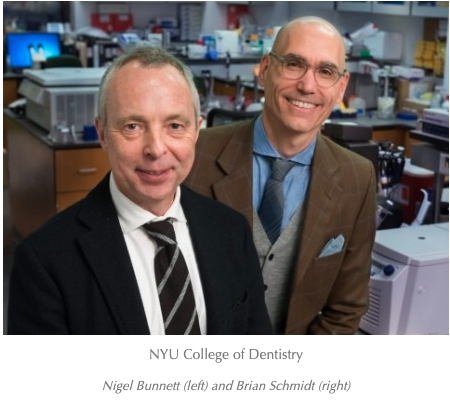
The five-year grant will support Bunnett and Schmidt’s collaborative research, which aims to ultimately yield improved pain management without the need for opioids.
The grant is funded through the NIH HEAL (Helping to End Addiction Long-term) Initiative, an effort to speed scientific research that enhances pain management and offers solutions for the national opioid crisis. Although opioids are widely used to treat chronic pain, their efficacy is limited and their side effects are notorious; use of these drugs often leads to misuse and addiction. Approximately 500,000 Americans died from opioid overdose over the last two decades. While many of these deaths are caused by opiates such as heroin, the cycle of addiction and death is often initiated by the use of prescription drugs that were diverted from their intended purpose.
Bunnett, who is currently the chair of the Department of Molecular Pathobiology at NYU College of Dentistry, and Schmidt, who directs the NYU Bluestone Center for Clinical Research, have collaborated since 2009 when they were colleagues at the University of California, San Francisco. In recent years, they have jointly received three NIH grants and one grant from the Department of Defense to fund their research on pain. The current NIH HEAL grant is the first time that Bunnett and Schmidt have secured collaborative funding as colleagues at NYU.
Their research explores exploring signaling mechanisms related to a family of proteins called G protein-coupled receptors (GPCRs), which control most disordered physiological processes, including pain, and are the target of one third of clinically used drugs. While GPCRs are thought to function at the surface of the cell, they can be subsumed within cellular organelles called endosomes. Once a GCPR enters an endosome, it is called an endosomal GPCR (eGPCR).
eGPCRs may be critical mediators of sustained neuronal excitability in the context of chronic pain. Accordingly, Bunnett and Schmidt seek to validate eGPCRs as therapeutic targets for chronic inflammatory, neuropathic, and cancer pain. As part of this work they will test the hypothesis that eGPCRs generate signals in subcellular compartments of neurons that are responsible for persistent excitation and chronic pain.
“Our hypothesis—that signaling continues after a GCPR enters an endosome—breaks with the currently accepted interpretation that this process squelches signaling,” said Bunnett. “Many GPCR-targeted drugs have failed clinical trials, but perhaps this is because drugs should be targeting eGPCRs inside the endosome instead.”
To test this eGPCR signaling hypothesis, the investigators will design nanoparticles that deliver antagonists and agonists of GPCRs into endosomes within neurons; the nanoparticles will selectively target neurons, promote GPCRs entering endosomes, and release eGPCR antagonist and agonists in the acidic environment within an endosome. In this way the nanoparticles will be used to experimentally probe the mechanisms by which eGPCRs generate signals that control neuronal excitation and pain. This nanoparticle delivery method will also enable the investigators to validate that eGPCRs are a viable and superior target for the treatment of chronic pain.
If their hypothesis is correct, eGPCRs may be suitable targets for the treatment of chronic pain, generating a pathway for new therapies without the side effects and addiction potential of opioids.
“Our aim is to lay the foundation for the development of new types of medication beyond opioids that alleviate chronic pain including inflammatory, neuropathic and cancer pain,” said Schmidt.
About the Bluestone Center for Clinical Research
The Bluestone Center for Clinical Research, in conjunction with the NYU Oral Cancer Center, is an academic research organization located at the NYU College of Dentistry. Bluestone's mission is to take a creative scientific approach to transform world health. Investigators at Bluestone Center conduct research on oral cancer, cancer symptomatology, pharmaceuticals, medical devices, emerging biotechnology, periodontics, implants, and oral health products.
About NYU College of Dentistry
Founded in 1865, New York University College of Dentistry (NYU Dentistry) is the third oldest and the largest dental school in the US, educating nearly 10 percent of all dentists. NYU Dentistry has a significant global reach with a highly diverse student body. Visit https://dental.nyu.edu for more.




